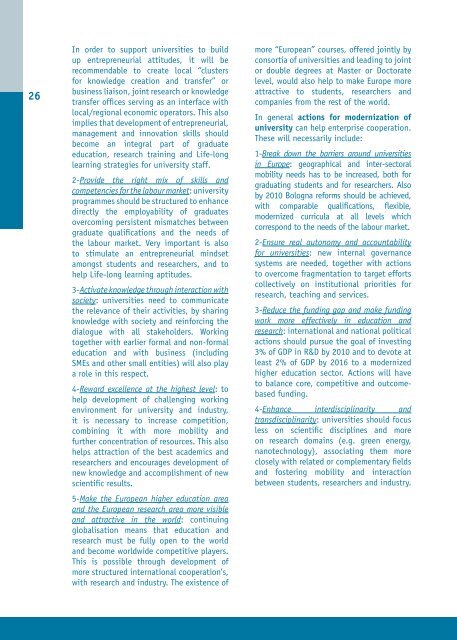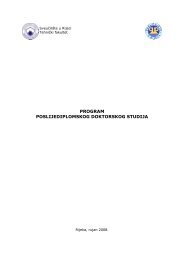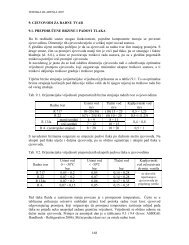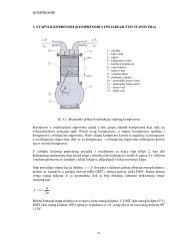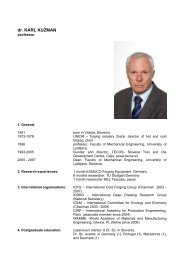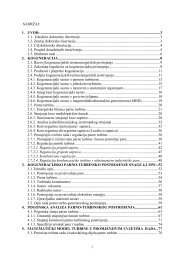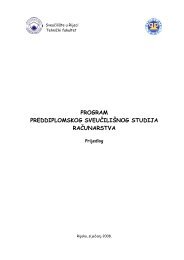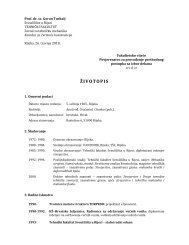universityâenterprise cooperation
universityâenterprise cooperation
universityâenterprise cooperation
Create successful ePaper yourself
Turn your PDF publications into a flip-book with our unique Google optimized e-Paper software.
26<br />
In order to support universities to build<br />
up entrepreneurial attitudes, it will be<br />
recommendable to create local “clusters<br />
for knowledge creation and transfer” or<br />
business liaison, joint research or knowledge<br />
transfer offices serving as an interface with<br />
local/regional economic operators. This also<br />
implies that development of entrepreneurial,<br />
management and innovation skills should<br />
become an integral part of graduate<br />
education, research training and Life-long<br />
learning strategies for university staff.<br />
2-Provide the right mix of skills and<br />
competencies for the labour market: university<br />
programmes should be structured to enhance<br />
directly the employability of graduates<br />
overcoming persistent mismatches between<br />
graduate qualifications and the needs of<br />
the labour market. Very important is also<br />
to stimulate an entrepreneurial mindset<br />
amongst students and researchers, and to<br />
help Life-long learning aptitudes.<br />
3-Activate knowledge through interaction with<br />
society: universities need to communicate<br />
the relevance of their activities, by sharing<br />
knowledge with society and reinforcing the<br />
dialogue with all stakeholders. Working<br />
together with earlier formal and non-formal<br />
education and with business (including<br />
SMEs and other small entities) will also play<br />
a role in this respect.<br />
4-Reward excellence at the highest level: to<br />
help development of challenging working<br />
environment for university and industry,<br />
it is necessary to increase competition,<br />
combining it with more mobility and<br />
further concentration of resources. This also<br />
helps attraction of the best academics and<br />
researchers and encourages development of<br />
new knowledge and accomplishment of new<br />
scientific results.<br />
5-Make the European higher education area<br />
and the European research area more visible<br />
and attractive in the world: continuing<br />
globalisation means that education and<br />
research must be fully open to the world<br />
and become worldwide competitive players.<br />
This is possible through development of<br />
more structured international <strong>cooperation</strong>’s,<br />
with research and industry. The existence of<br />
more “European” courses, offered jointly by<br />
consortia of universities and leading to joint<br />
or double degrees at Master or Doctorate<br />
level, would also help to make Europe more<br />
attractive to students, researchers and<br />
companies from the rest of the world.<br />
In general actions for modernization of<br />
university can help enterprise <strong>cooperation</strong>.<br />
These will necessarily include:<br />
1-Break down the barriers around universities<br />
in Europe: geographical and inter-sectoral<br />
mobility needs has to be increased, both for<br />
graduating students and for researchers. Also<br />
by 2010 Bologna reforms should be achieved,<br />
with comparable qualifications, flexible,<br />
modernized curricula at all levels which<br />
correspond to the needs of the labour market.<br />
2-Ensure real autonomy and accountability<br />
for universities: new internal governance<br />
systems are needed, together with actions<br />
to overcome fragmentation to target efforts<br />
collectively on institutional priorities for<br />
research, teaching and services.<br />
3-Reduce the funding gap and make funding<br />
work more effectively in education and<br />
research: international and national political<br />
actions should pursue the goal of investing<br />
3% of GDP in R&D by 2010 and to devote at<br />
least 2% of GDP by 2016 to a modernized<br />
higher education sector. Actions will have<br />
to balance core, competitive and outcomebased<br />
funding.<br />
4-Enhance interdisciplinarity and<br />
transdisciplinarity: universities should focus<br />
less on scientific disciplines and more<br />
on research domains (e.g. green energy,<br />
nanotechnology), associating them more<br />
closely with related or complementary fields<br />
and fostering mobility and interaction<br />
between students, researchers and industry.


